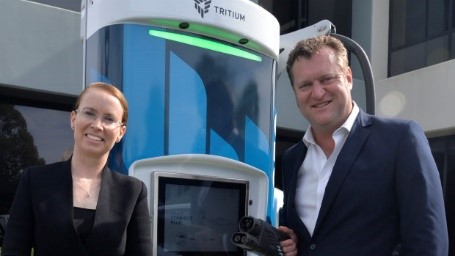Demand is particularly robust in North America, helped by commitments towards the electrification of transport by US President Joe Biden and the emergence of EV ride-sharing by outfits such as Revel, which offer on-demand e-bikes, e-scooters and Teslas.
“If you consider the size of orders that are being spoken about by customers like Shell and BP and Siemens, where they’re talking about orders in the thousands, you can kind of see how that will dwarf our existing fleet very quickly,” Ms Hunter told The Australian Financial Review.
The company has so far deployed more than 4500 charging stations across 41 countries and is vying for the leading position in several mature EV markets such as Norway and California.
The Cigna raising – which follows a similar $45 million debt issue with the same firm in June last year – will further boost the Brisbane-based start-up’s financial firepower as it seeks to boost manufacturing of its systems in major overseas markets, including an expansion of its US factory in Los Angeles and the establishment of a new European plant.
Tritium’s deal in May with a special purpose acquisition company already ensured its balance sheet would be boosted to as much as $390 million once the deal goes through, scheduled for the December quarter. Ms Hunter said the deal and listing preparations were tracking to plan, with the exact timing within the December quarter yet to be determined.
The company is also backed by investors including energy entrepreneur Trevor St Baker, coal investor Brian Flannery and engineering firm Varley Group.
Ms Hunter said the emergence of the electric boat market was exciting for Tritium, which has been selling into high-end European locations such as yacht clubs in Monaco and Portofino and the Venetian canals, but also has a potential customer closer to home in New Zealand.
In Australia, Tritium has picked up sales thanks to the federal government’s Future Fuels Fund, locking in sales of more than 300 systems to Evie Networks and potential sales for Ampol’s proposed network, Ms Hunter said. She added that the start of imports of electric utes and four-wheel drives would open up another opportunity for Tritium especially in rural regions.
***
Forward-Looking Statements
Certain statements made in this document are “forward-looking statements” with respect to the transaction between Decarbonization Plus Acquisition Corporation II, a Delaware corporation (“DCRN”), Tritium Holdings Pty Ltd, an Australian proprietary company limited by shares (“Tritium”), and Tritium DCFC Limited, an Australian public company limited by shares (“NewCo”) and including statements regarding the benefits of the transaction, the anticipated timing of the transaction, the services offered by Tritium and the markets in which it operates, and NewCo’s projected future results. These forward-looking statements generally are identified by the words “estimates,” “projected,” “expects,” “anticipates,” “forecasts,” “plans,” “intends,” “believes,” “seeks,” “targets”, “may,” “will,” “should,” “would,” “will be,” “will continue,” “will likely result,” “future,” “propose,” “strategy,” “opportunity” and variations of these words or similar expressions (or the negative versions of such words or expressions) that predict or
